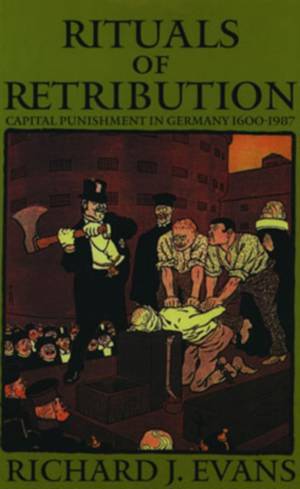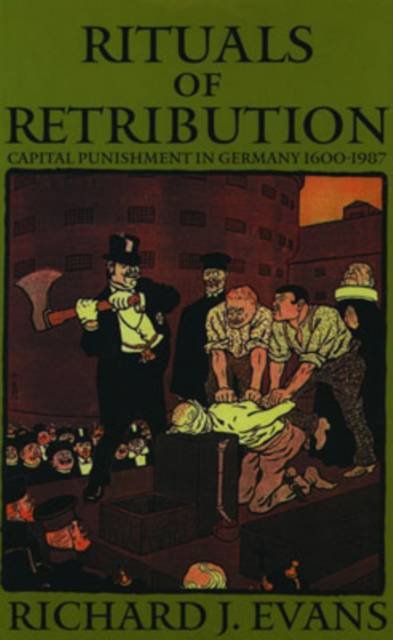
- Retrait gratuit dans votre magasin Club
- 7.000.000 titres dans notre catalogue
- Payer en toute sécurité
- Toujours un magasin près de chez vous
- Retrait gratuit dans votre magasin Club
- 7.000.0000 titres dans notre catalogue
- Payer en toute sécurité
- Toujours un magasin près de chez vous
Rituals of Retribution
Capital Punishment in Germany, 1600-1987
Richard J Evans
Livre relié | Anglais
524,45 €
+ 1048 points
Description
The state has no greater power over its own citizens than that of killing them. This book examines the use of that supreme sanction in Germany, from the seventeenth century to the present. Richard Evans analyses the system of `traditional' capital punishments set out in German law, and the ritual practices and cultural readings associated with them by the time of the early modern period. He shows how this system was challenged by Enlightenment theories of punishment and broke down under the impact of secularization and social change in the first half of the nineteenth century. The abolition of the death penalty became a classic liberal case which triumphed, if only momentarily, in the 1848 Revolution. In Germany far more than anywhere else in Europe, capital punishment was identified with anti-liberal, authoritarian concepts of sovereignty. Its definitive reinstatement by Bismarck in the 1880s marked not only the defeat of liberalism but also coincided with the emergence of new, Social Darwinist attitudes towards criminality which gradually changed the terms of debate. The triumph of these attitudes under the Nazis laid the foundations for the massive expansion of
capital punishment which took place during Hitler's `Third Reich'. After the Second World War, the death penalty was abolished, largely as a result of a chance combination of circumstances, but continued to be used in the Stalinist system of justice in East Germany until its forced abandonment as a result of international pressure exerted in the regime in the 1970s and 1980s. This remarkable and disturbing book casts new light on the history of German attitudes to law, deviance, cruelty, suffering and death, illuminating many aspects of Germany's modern political development. Using sources ranging from folksongs and ballads to the newly released government papers from the former German Democratic Republic, Richard Evans scrutinizes the ideologies behind capital punishment and comments on interpretations of the history of punishment offered by writers such as Foucault and Elias. He has made a formidable contribution not only to scholarship on German history but also to the social theory of punishement, and to the current debate on the death penalty.
capital punishment which took place during Hitler's `Third Reich'. After the Second World War, the death penalty was abolished, largely as a result of a chance combination of circumstances, but continued to be used in the Stalinist system of justice in East Germany until its forced abandonment as a result of international pressure exerted in the regime in the 1970s and 1980s. This remarkable and disturbing book casts new light on the history of German attitudes to law, deviance, cruelty, suffering and death, illuminating many aspects of Germany's modern political development. Using sources ranging from folksongs and ballads to the newly released government papers from the former German Democratic Republic, Richard Evans scrutinizes the ideologies behind capital punishment and comments on interpretations of the history of punishment offered by writers such as Foucault and Elias. He has made a formidable contribution not only to scholarship on German history but also to the social theory of punishement, and to the current debate on the death penalty.
Spécifications
Parties prenantes
- Auteur(s) :
- Editeur:
Contenu
- Nombre de pages :
- 1048
- Langue:
- Anglais
Caractéristiques
- EAN:
- 9780198219682
- Date de parution :
- 09-05-96
- Format:
- Livre relié
- Format numérique:
- Genaaid
- Dimensions :
- 241 mm x 165 mm
- Poids :
- 1621 g

Les avis
Nous publions uniquement les avis qui respectent les conditions requises. Consultez nos conditions pour les avis.






